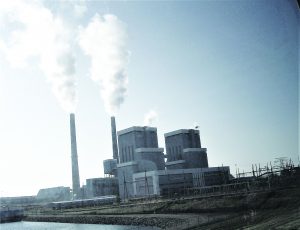EPA: Letting polluters off the hook

Polluters, such as this North Dakota power plant, can break environmental rules indefinitely under new emergency policy.
Credit
Photo by Talli Nauman
BILLINGS, Mont. – EPA’s March 26 policy memo to corporate America, tribal and other governments — announcing relaxed enforcement of pollution rules during the ongoing Covid-19 pandemic — raised a furor among native community health advocates and representatives of allied conservation groups across the West.
The memo states that the agency generally will not “seek penalties for violations of routine compliance monitoring, integrity testing, sampling, laboratory analysis, training, and reporting or certification obligations in situations where the EPA agrees that Covid-19 was the cause of the noncompliance and the entity provides supporting documentation to the EPA upon request.”
The policy outlines information and actions that non-compliant companies might be asked to submit to justify their failures. It leaves tribal, state and other agencies to “use discretion when making decisions to conduct routine inspections,” so they can prioritize attention to acute risks and imminent health threats.
“It is beyond disappointing that the EPA decided to use the Covid-19 crisis as an excuse to let polluters off the hook,” said Mandan Hidatsa & Arikara community health advocate Lisa DeVille, of Mandaree, N.D. “In Indian country, we rely on the enforcement of EPA standards to ensure we have clean air and water. Not enforcing EPA standards will hurt my people, especially those who are already vulnerable, such as children, the elderly, and those with pre-existing conditions like asthma,” she added.
DeVille, a member of the Western Organization of Resource Councils’ board of directors, sits on EPA’s National Environmental Justice Advisory Council. She said she is demanding “that the EPA continue to enforce its standards.”
The Western Organization of Resource Councils (WORC), based in Billings, is a network of eight grassroots organizations in seven Western states with 15,000 members, many of them land based.
Another organization, the Western Environmental Law Center, based in Eugene, Ore., criticized the EPA advice as a “non-enforcement policy”, and on April 3 declared, “The Covid-19 outbreak has had and will continue to have a profound impact on daily life and operations across all sectors of society. It is now more important than ever that U.S. laws passed to protect a healthy and livable human environment are preserved and enforced—not weakened.”
EPA asserts that the policy is temporary but does not set a date for it to lapse. The agency does not expect companies to catch-up on missed monitoring or testing of water and air quality.
“The irony is that the agency Americans rely on to protect our health is responding to a health crisis by relaxing enforcement,” responded Clearwater, Wyo. rancher Bob LeResche, a board member of Powder River Basin Resource Council.
“Perhaps the most troubling thing is that EPA’s policy anticipates ‘acute risk and an imminent threat to human health and the environment.’ Their urging of polluters to just ‘make every effort to comply’ sends a very wrong message to the companies whose operations could put Americans at grave risk,” he added.
Joining in the chorus was Barbara Vasquez, member of Western Colorado Alliance and chair of WORC’s Oil and Gas Team from Cowdrey, Colo. “It is outrageous that this administration would use the cover of the Covid-19 crisis to dramatically weaken protections for human health and the environment,” she said.
“Indefinitely forgoing enforcement and compliance is putting the people of this country in harm’s way while we are already struggling to survive this pandemic,” she noted. Calling on EPA to “rescind this waiver,” she added, “We know all too well that we cannot rely on industries and power plants to self-report air and water pollution.”
Shannon Ansley, an Idaho Organization of Resource Councils member from Pocatello, Idaho, opined, “It is a shameful abdication of public trust that the Trump Administration hides under the blanket of Covid-19 and thinks that no one will notice or care what they are doing.
“As a hydrogeologist who has worked closely with EPA for decades, I cannot accept that this broad-brush relaxation of the rules is necessary. Giving large polluters a free pass, especially at this critical time, is completely unacceptable. Shame on our government, again,” she added.
The policy makes no exception for violations of the Clean Air Act, even in areas with ambient air pollution levels that exceed health-based thresholds, the Western Environmental Law Center pointed out.
“These areas, which are often low-income and home to marginalized communities, already have elevated rates and severity of respiratory disease. Exposure to air pollution is an important risk factor for viral infections. Health experts warn that those with existing respiratory diseases are particularly vulnerable to Covid-19,” it said.
“Minimizing exposure to air pollution is an important step to reduce the likelihood of severe disease, particularly in communities already facing disproportionate environmental burdens and health risks,” it noted, calling the policy “an affront to environmental justice.”
In an analysis of the legal context, the environmental law center commented that mandatory periodic self-reporting by polluters “are often the only way that communities can get any information at all about air pollution around them. EPA’s policy interferes with the public’s right to know what is in the air, in the water, and in the ground around them,” it concludes.
Finally, the analysis states, “If a polluter has the resources to remain operational through the Covid-19 outbreak, it has the resources to continue to comply with all applicable environmental laws.
(Contact Talli Nauman at talli.nauman@gmail.com)
